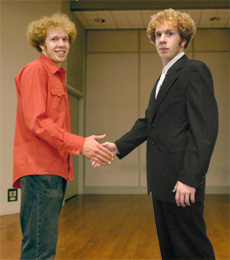Club mimics ‘Fight Club’, without fighting

Online Poster
Oct 28, 2004
Last updated on May 11, 2016 at 04:41 p.m.
Paul Holze’s Fight Club-based student organization, Project Mayhem, does not fight. And while the group is molded around the film’s central themes, he is willing to break the on-screen brawlers’ first rule of secrecy to profess its service-oriented goals.
“I watched Fight Club for the first time last year and began thinking how cool it would be to have a club based on it here,” said Holze, a junior in ACES. “But Project Mayhem isn’t about fighting – it’s about doing projects that reflect themes in the movie, such as anti-materialism.”
Although some students originally signed up thinking that actual fighting would take place, Holze made it clear that fighting would not be involved.
“We’re not about that,” Holze said. “The fighting is just used in the movie as a representation of bigger ideas, and is not something people should take seriously.”
Get The Daily Illini in your inbox!
He said the club’s projects were carried out in the form of homework assignments. So far, there have been two of them. The first assignment was to leave copies of the club’s “rules” – taken directly from the movie – in copy machines around campus.
“Leaving the rules around campus was just to get people curious about Project Mayhem,” Holze said.
The second assignment was to find and question credit card companies around campus that targeted students, he explained.
“Basically, we talked to the companies and tried to make them see the repercussions of coaxing students into signing up for credit cards,” Holze said. “We also talked to students to make sure they realized what they were getting into by signing up.”
Holze would like to sell soap, a major symbol in Fight Club, around campus as a future task.
“I think it would be a cool fund-raiser,” he said. “The money is not really important, but it could go toward us getting out there and doing more projects.”
He also mentioned that he would like to form separate committees for the club, in which they could each develop their own ideas for service projects.
Holze said it was important for student organizations to have a great deal of member activity and involvement.
“I was part of one organization my freshman year, and we would just sit there,” he said. “I thought to myself, ‘I could do this in class.'”
Lisa Garnett, a junior in ACES who is also involved with Project Mayhem, attributed Holze’s community and campus involvement to having a well-balanced personality.
“He gets involved in everything he can,” Garnett said. “He’s really motivated and not much of a time-waster – he is always able to do well in his classes, be involved in lots of clubs and devote time to his faith.”
Holze is also the president of Club Kramerica, a student organization dedicated to the sitcom Seinfeld.
“Club Kramerica is mainly about getting together and having a good time, not so focused on community outreach like Project Mayhem,” he said. “We try not to just sit around and watch the episodes, but actually relive them.”
For example, he said the group annually celebrates Festivus, a holiday made up by the show’s Frank Costanza character played by Jerry Stiller.
Holze has helped devise and implement a service project called Adopt-A-Campus Pathway through his involvement in Club Kramerica and Project Mayhem. This project allows organizations to adopt portions of the University’s grounds to keep clean.
“There’s been a lot of support for this program,” he said. “The Facilities and Services department has given us supplies and money to do it.”
Alex Verticchio, a fellow Club Kramerica member and sophomore in LAS, said Holze was able to initiate such programs because of his communication skills.
“He has the ability to effectively communicate with higher-ups to get things done,” Verticchio said. “Organizing the Adopt-A-Campus Pathway program is a perfect example of that.”
Holze said that Project Mayhem involvement has been on an individual basis so far, but that he would soon like to have weekly meetings for the club.
He said the club was just getting started, and that he would encourage anyone to join for a creative way to benefit the community.
“It’s about spreading the idea that it’s not what we have in life that really matters, but who we help,” Holze said.





